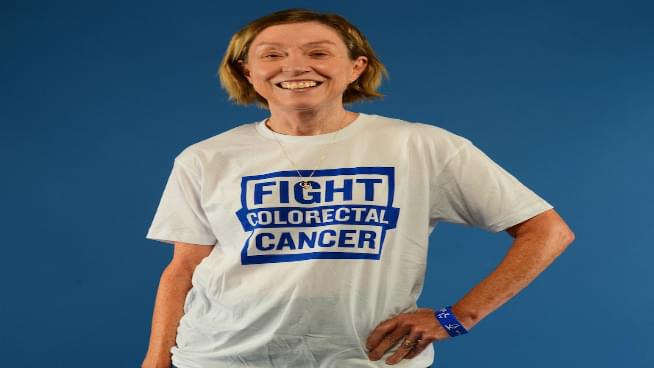
Colon and rectal cancer are the second leading cause of cancer deaths in the United States for both men and women. One Topeka woman says enough is enough.
Alice Marshall is from the Capital City and she along with 29 other men and women will be featured in an upcoming campaign to bring awareness to this horrible disease. She will be featured among the bright lights in the biggest city in the United States, which is New York City. A PSA will run on the big screen inside the NASDAQ headquarters. It will play before the opening bell on February 27th.
Here is what the press release says about the event and what Alice has to say:
Topeka resident Alice Marshall will be one of the 29 people featured in a new PSA in Times Square this March for Colorectal Cancer Awareness Month. Marshall a colorectal cancer survivor, is an awareness ambassador for Fight Colorectal Cancer (Fight CRC), the country’s leading advocacy organization focused on colorectal cancer policy and research. The PSA will launch during the NASDAQ Opening Bell Ceremony on Feb. 27 at 9:00 am ET. Marshall’s story will be featured on Fight CRC’s Facebook page and blog on March 19.
Colon and rectal cancers (colorectal cancer) make up the second-leading cause of cancer deaths among men and women combined. Sixty percent of colorectal cancer deaths could be prevented with screening. Marshall has dedicated a year of volunteer time to Fight CRC to raise awareness about the importance of screening using her story in an effort to save lives.
“I would like to help others who are experiencing this challenge. I have had family and friends who support me, but I realize not everyone has that. I have relied heavily on my faith, family, friends,
and incredible medical team to help me win my challenge,” said Marshall.Her story is one of many stories launching the annual March Colorectal Cancer Awareness campaign, a movement uniting the over one million survivors of colorectal cancer and their loved
ones to get behind a cure and prevent future cases with screening.“Each year we select a group of ambassadors to represent our community of over one millionsurvivors four our March Colorectal Cancer Awareness campaign. Each year, our group of
ambassadors bravely rally to raise awareness for this disease,” said Anjee Davis, president of Fight CRC. “We hope their stories resonate with the over 30 million people 50 and over who have
NOT been screened. And compel them to talk to their doctor about their screening options.”To join Fight CRC’s awareness efforts this March, visit getbehindacure.org to sign the petition to make sure everyone has access to screening. Supporters can also get involved by taking a
#StrongArmSelfie and sharing it on social media.
Here are some facts about Colorectal Cancer from fighcrc.org:
About Colorectal Cancer:
• 2nd leading cause of cancer death among men & women combined
• 3rd most commonly diagnosed cancer
• 140,250 estimated new cases in 2018
• 50,630 estimated deaths in 2018
• 1 in 20 people will be diagnosed in their lifetimes
• 1 in 3 people are not up-to-date with screening
• 30+ million, ages 50-75, are not up-to-date on screening
• 60% of deaths could be prevented with screeningHereditary/Genetic Stats:
• People with a first-degree relative (parent, sibling or child) with colon cancer are between
two to three times more likely to develop the cancer than those without a family history.
• 25% of people diagnosed with colorectal cancer have a family history.Early-Age Onset (under 45) Incidence:
• Data suggests that the incidence of colorectal cancer for those under 50 is on the rise and
more young people are being diagnosed with colorectal cancer.
• 10-11% of colon cancers and 18% of rectal cancers are diagnosed in individuals under the
age of 50
• Up to 22% of colorectal cancer cases diagnosed before the age of 50 are associated
hereditary cancer syndromes; additional cases are related to inflammatory bowel disease.
• Colorectal cancers in individuals under 50 are more likely associated with symptoms. It’s
very important to seek medical care for unexplained persistent rectal bleeding and other
signs and symptoms.Resources:
American Cancer Society:
https://cancerstatisticscenter.cancer.org/#/cancer-site/Colorectum
National Cancer Institute:
http://seer.cancer.gov/statfacts/html/colorect.html
Centers for Disease Control and Prevention
https://www.cdc.gov/cancer/colorectal/sfl/index.htm







